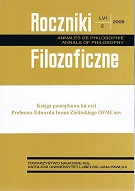Prophetia Hildegardis. Autorytet Hildegardy z Bingen w sporach między jezuitami i Akademią Krakowską
Prophetia Hildegardis. Hildegard of Bingen’s Authority in Disputes between Jesuits and Cracovian Academics
Author(s): Justyna Łukaszewska-HaberkowaSubject(s): Philosophy
Published by: Towarzystwo Naukowe KUL & Katolicki Uniwersytet Lubelski Jana Pawła II
Keywords: Middle Ages; women writers; mysticism; visions; anti-Jesuit literature; średniowiecze; literatura kobieca; mistyka; wizje; literatura antyjezuicka
Summary/Abstract: Hildegard of Bingen and her spiritual writings are an interesting example of female thought in the Middle Ages. She was not only the abbess of a convent who had her visions, but also a politically active woman that took an important part in the social life of the twelfth century. Hildegard spoke about controversial problems. It remains true that while preaching she expressed her opinions, described her revelations and proclaimed the will of God. It is no doubt that not only Hildegard herself grew in fame but also her convent, things that we may attribute to her writings. Commonly, Hildegard of Bingen was remembered as a Benedictine nun and as a person who revealed the spiritual knowledge. Her visions were well known. The writings and authority of Hildegard as a prophet intensified so much that in the thirteen century it was used against the Dominican and the Franciscan Order. In this century some false visions were written and attributed to Hildegard herself. Later on one of them was also published against Jesuits. The copy of this print is in the Library of the Jagiellonian University in Cracow.
Journal: Roczniki Filozoficzne
- Issue Year: 56/2008
- Issue No: 2
- Page Range: 343-357
- Page Count: 15
- Language: Polish

